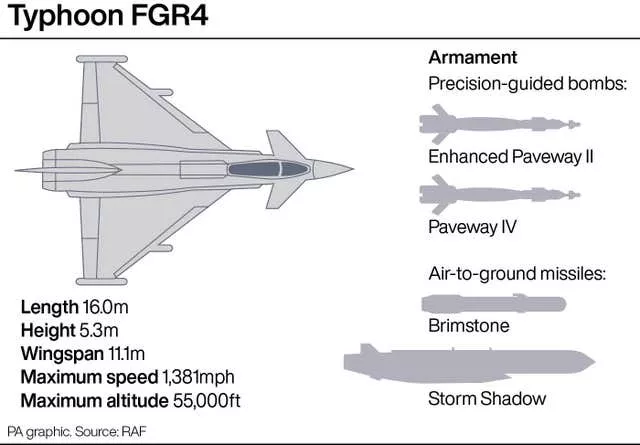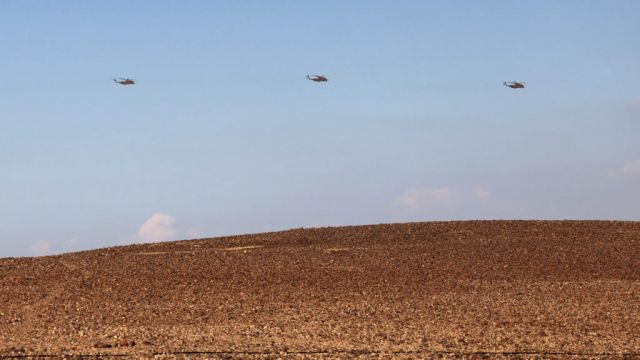Additional reporting by Reuters
Leaders of the G7 nations have condemned Iran's attack on Israel and said they would work to try to prevent an “uncontrollable regional escalation” in the Middle East.
Italy, which holds the rotating presidency of the G7, had called a meeting of G7 heads after US president Joe Biden pledged a coordinated diplomatic response to the unprecedented drone and missile attack launched overnight by Iran.
Israel said Iran launched 170 drones, more than 30 cruise missiles and more than 120 ballistic missiles in an attack that set off air raid sirens across the country.
The assault was launched in response to a strike widely blamed on Israel on an Iranian consular building in Syria earlier this month which killed two Iranian generals.
It marks the first time a direct military assault has been launched by Iran on Israel despite enmity dating back to the country’s 1979 Islamic Revolution.
The development threatens to become a major regional escalation after years of shadow wars fought between the two foes as the war in Gaza inflames decades-old tensions in the Middle East.
President Biden spoke by secure video with the leaders of the G7 today. The leaders condemned Iran’s unprecedented attack against Israel and reaffirmed the G7's commitment to Israel's security. pic.twitter.com/ZvdSJyNbFY
— The White House (@WhiteHouse) April 14, 2024
“With its actions, Iran has further stepped toward the destabilisation of the region and risks provoking an uncontrollable regional escalation. This must be avoided,” a G7 statement issued by Italy said.
The G7 leaders, which includes the US, UK, Canada, Italy, France, Germany and Japan, as well as the European Union, spoke for just under an hour on a video conference on Sunday, and called for Iran to exercise restraint.
“In this spirit, we demand that Iran and its proxies cease their attacks, and we stand ready to take further measures now and in response to further destabilising initiatives,” it said.
Mr Biden has warned Israeli prime minister Binyamin Netanyahu the US will not take part in a counter-offensive against Iran if Israel decides to retaliate.
The G7 statement also pledged to work “towards an immediate and sustainable ceasefire” in Gaza after more than six months of fighting.

The US and UK have offered staunch support for Israel, with the UK's Ministry of Defence saying RAF warplanes in Iraq and Syria had been deployed to intercept “any airborne attacks within range of our existing missions”.
Iran has threatened a “heavier” response if the US co-operates with any further Israeli military action against it.
Israeli military spokesperson rear admiral Daniel Hagari said 99 per cent of more than 300 drones, cruise missiles and ballistic missiles had been shot down outside the country’s borders, with aircraft intercepting more than 10 cruise missiles.
Rescuers said a seven-year-old girl was seriously wounded in southern Israel, apparently in a strike, although they said police were still investigating the circumstances of her injuries.
Israelis’ reality in the last hours: pic.twitter.com/VXeHM8WqJi
— Israel Defense Forces (@IDF) April 14, 2024
Iran had been threatening to attack since an air strike, which it blamed on Israel, killed two Iranian generals in Syria on April 1st.
Mr Netanyahu spoke to Mr Biden, who said he had “reaffirmed America’s ironclad commitment to the security of Israel”.
Mr Biden said the US had helped Israel to “take down nearly all” of the drones and missiles.
Mr Netanyahu posted on X: “We intercepted. We repelled. Together we will win.”
But Iran has warned Washington against co-operation with Israel in any military operation, with Iranian president Ebrahim Raisi saying: “Any new adventure against the interests of the Iranian nation would be met with a heavier and regretful response from the Islamic Republic of Iran.”

The state-run IRNA news agency quoted General Mohammad Hossein Bagheri, the chief of staff of the Iranian armed forces, as saying that Tehran had communicated its message to the US through the Swiss embassy, which handles US interest in Iran in the absence of diplomatic relations.
Tehran has largely avoided directly attacking Israel, despite its targeted killings of nuclear scientists and sabotage campaigns on Iran’s atomic sites, instead targeting Israeli or Jewish-linked sites through proxy forces.
But it vowed retaliation for what it said was an Israeli strike on its Damascus consulate on April 1st.
I strongly condemn the serious escalation represented by the large-scale attack launched on Israel by Iran.
I call for an immediate cessation of these hostilities.
Neither the region nor the world can afford another war. https://t.co/Kmbt3zWMw7— António Guterres (@antonioguterres) April 14, 2024
Taoiseach Simon Harris, Tánaiste Micheál Martin, UN secretary-general Antonio Guterres and Canadian prime minister Justin Trudeau joined a growing chorus of western leaders urging against escalation.
“I strongly condemn Iran’s reckless and large-scale attack on Israel,” Mr Harris said in a statement.
“I urge all sides to show restraint now and to avoid any escalation in military action and the devastation that would cause.”
Mr Guterres echoed the Taoiseach's calls, urging “all parties to exercise maximum restraint to avoid any action that could lead to major military confrontations on multiple fronts in the Middle East”.
“I have repeatedly stressed that neither the region nor the world can afford another war” he added.







